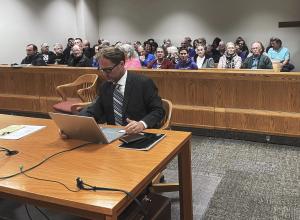Bellwether Case on Medical Battery Speeds Toward Trial
Desperate Defendants’ Final Motion to Dismiss Schara v. Ascension Health et al. fails, Opening Door for Breakthrough Precedent at Jury Trial
In front of a packed crowd this Monday in Appleton, Wisconsin’s Outagamie County Circuit Courthouse, landmark wrongful death lawsuit Schara v. Ascension et al. (Case Number 2023CV000345) prevailed over one final attempt by the defense at dismissal—securing a first-of-its-kind jury trial set to redefine the impact of intent in medical death cases. With trademark clarity, Judge Mark J. McGinnis rejected virtually all motions by the defense to dismiss Schara’s charges. “This case is ready to be tried in November,” he said.
Monday’s courtroom survival ensured that in November 2024 a jury of Wisconsinites—rather than attorneys representing healthcare conglomerates—will decide a case that has far-reaching legal ramifications for American medicine.
Schara v. Ascension Health et al. alleges that Appleton’s Ascension St. Elizabeth Hospital facilitated the wrongful death of the plaintiff’s daughter, Grace Schara. Additionally, the lawsuit alleges that five doctors defied informed consent laws, and that those same doctors and two nurses committed battery when they killed Grace—a 19-year-old with Down syndrome who loved Jesus, her family, and Elvis—on October 13, 2021 after the named medical personnel fraudulently labeled her as a DNR patient, administered a lethal drug cocktail known to kill, and then brazenly refused to save her life as she died. Due to “hospital protocols,” Grace Schara’s parents were forced to watch her die on FaceTime—after her dad was escorted out of the facility by an armed guard.
Monday’s victory by Schara and his legal team, which is led by the nationally recognized Mendenhall Law Group, offers a new playbook for families seeking justice in medical wrongful death suits. Because the key claim of Schara v. Ascension et al. is battery, an intentional tort, this trial will be the first time that doctors’ intentions come into play in this manner in a civil case.
“Our victory today to secure a jury trial for the battery claim in Schara v. Ascension et al. isn’t just our next step toward justice for Grace,” says Scott Schara. “It’s a playbook for all Americans who have lost loved ones at the hands of what I, and many others, believe to be a medical establishment dangerously committed to harm—more concerned with incentives and penalties than patient health. Our case simply surviving today should send shockwaves across the nation, because we showed how to pierce the medical malpractice veil with a legal brief. Winning this claim will create a tidal wave—and a game-changing legal precedent.”
To illustrate the battery claim in Schara v. Ascension et al. simply: “Imagine a physician who fails to fully inform a patient about the risks of a leg amputation, but the patient does agree to have his leg amputated. This violates the duty to obtain informed consent. Now imagine a physician who amputates a patient’s leg without obtaining consent or telling the patient or the patient’s family what he is doing (and, in this case, removing the patient’s power of attorney and parent from the hospital first). That’s a battery.” [Quoted from Schara’s October 23 Brief in Opposition, p. 8]
This is important because the defendants’ attorneys have argued that their clients had state statutory protection for their actions. If America followed the defendants’ perspective on medical battery, hospitals would become “walled gardens where any intentional misconduct could be treated as simple negligence.” And, “in this world, any unethical or financially motivated physician could administer deadly drugs without consent for malign purposes, including making room for new patients […] and even that liability would be subject to insurance coverage.” [Quoted from Schara’s October 23 Brief in Opposition, p. 12] It is time to put an end to state-sanctioned medical murder.
Ramifications of Schara v. Ascensions et al.
If Schara wins the case at trial:
—Medical malpractice state statutory protection no longer applies when doctors commit crimes without the patient’s knowledge
—Medical malpractice insurance protection also no longer applies
—The statute of limitations on wrongful death claims is increased substantially
—Intentional torts facilitate punitive damages, so attorneys would be willing to take wrongful death cases on contingency
So it’s no surprise that on Monday, the increasingly stymied legal team of the doctor defendants working for Ascension Health—the largest “Catholic” healthcare system in America—would throw one final “hail mary” to dismiss the plaintiff’s claims. But Schara has succeeded.
As Grace would say, “God did it.” This landmark lawsuit has survived—and its trial, the first of its kind, will decide the intent behind why Grace Schara didn’t.
Andrew Lohse
Overton & Associates
andrew@overtonandassociates.com
Visit us on social media:
LinkedIn
Legal Disclaimer:
EIN Presswire provides this news content "as is" without warranty of any kind. We do not accept any responsibility or liability for the accuracy, content, images, videos, licenses, completeness, legality, or reliability of the information contained in this article. If you have any complaints or copyright issues related to this article, kindly contact the author above.


